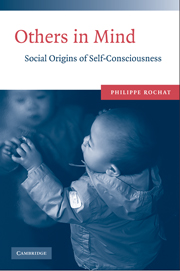Book contents
- Frontmatter
- Contents
- Foreword by Jerôme Bruner
- Preface
- Introduction: Main Ideas
- 1 Self-Conscious Species
- 2 Six Propositions
- 3 Varieties of Self-Reflective Mind State
- 4 Mind States in Development
- 5 Birth of Self-Consciousness
- 6 Shame and Self-Knowledge
- 7 The Roots of Guilt
- 8 Giving and Sharing
- 9 Origins of Owning and Sharing
- 10 Social Construction of Identity
- Conclusion: Moral Space and the Self
- Postscript Note
- References
- Index
6 - Shame and Self-Knowledge
Published online by Cambridge University Press: 05 August 2012
- Frontmatter
- Contents
- Foreword by Jerôme Bruner
- Preface
- Introduction: Main Ideas
- 1 Self-Conscious Species
- 2 Six Propositions
- 3 Varieties of Self-Reflective Mind State
- 4 Mind States in Development
- 5 Birth of Self-Consciousness
- 6 Shame and Self-Knowledge
- 7 The Roots of Guilt
- 8 Giving and Sharing
- 9 Origins of Owning and Sharing
- 10 Social Construction of Identity
- Conclusion: Moral Space and the Self
- Postscript Note
- References
- Index
Summary
Through shame, we endow others with indubitable power.
Jean-Paul Sartre, Being and NothingnessThe knowledge that derives from the contemplation of the self can be a source of great anxiety, often associated with a “self-conscious” experience of fear and devaluation. But why is that? Why is human self-knowledge so often associated with terror and negative experiences, rather than awe or admiration? What is the big fear?
The negative emotional connotation of self-knowledge is revealing of the constitutive nature of the human psyche, a psyche that is primarily determined by the pervasive propensity to have others in mind, others who are represented as judges and evaluators of the self.
In the context of such propensity, shame is a central emotion, the epitome of self-consciousness. The aim of this chapter is thus to discuss the foundations of human shame in relation to self-knowledge. What does such a basic evaluative emotion tell us about the way we represent ourselves?
The word shame captures a profound, complex, and too often neglected emotion: the experience of self in relation to others. Such an emotion has, by definition, some negative affective tone. Shame is “the painful feeling arising from the consciousness of something improper, ridiculous, dishonorable” (Random House Unabridged Dictionary).
I have already mentioned the terror of self-recognition observed by Carpenter and collaborators in the adult Biamis of Papua New Guinea. When confronted for the first time with their own specular image, they show many bodily signs associated with the experience of great fear.
- Type
- Chapter
- Information
- Others in MindSocial Origins of Self-Consciousness, pp. 105 - 117Publisher: Cambridge University PressPrint publication year: 2009



